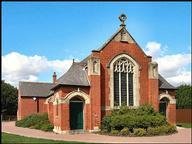Quiz Answer Key and Fun Facts
1. Some aspects widely taught in Baptist congregations in the 18th and 19th century are no longer taught today in the majority of Baptist churches. In some independent Baptist congregations a theory and movement called "Landmarkism" is still taught. "Landmarkism" is a theory centered on a type of Baptist ecclesiology that deals in the beginnings of Baptists during the apostolic period. What other similar theory did Baptists believe in during the 19th to early 20th century about the origin of the Baptist church?
2. Calvinism is spoken about positively in many Baptist congregations. What Englishman and Particular Baptist created a Calvinist Baptist church in London, England in 1638?
3. According to William Cleaver Wilkinson, who was a professor of poetry and theology and a Baptist preacher, what are the only two things commanded of a Baptist, as stated in his work "Religious Denominations. IV. The Baptist Denomination" (1888)?
4. In one of the churches I went to as a child I was taught the Bible is literally true. They called it "Biblical literalism" and defined it as meaning that the Bible is "without error or inconsistency in all that is written therein contained". What were they confusing "Biblical literalism" with?
5. There are several denominations of Baptist churches out there. A friend I went to school with invited me to his church one Sunday and it was a small church of about 50 people. They were "Hard Shell" Baptists. What name are they more commonly known as today?
6. Going back to question one, I once heard a story at a Baptist Church near my home about the Decian persecution in which a Roman priest opposed Pope Cornelius in 251 CE, arguing that those who had stopped practicing Christianity during the persecution could not be accepted back into the church without being rebaptized. He and his supporters were excommunicated, and this Baptist Church believes that this excommunicated Pope was a founding father of Baptists. Who is this man?
7. Though one of the first Baptist churches was created in 1608/09 by John Smyth, an Englishman, it wasn't created in England. Where was Smyth's General Baptist Church created?
8. As of 2001 there have been four US Presidents who were Baptists. Two were Northern Baptists and two were Southern Baptists. Can you tell me the two who were Southern Baptists?
9. When I was a child the church I went to only read the King James Version of the Bible. What Bible(s) do most Southern Baptist pastors use in their churches as of 2015?
10. I was taught as a Southern Baptist that Baptists have more adherents than any other Christian denomination in the United States. Is this true or false?
Source: Author
Nammage
This quiz was reviewed by FunTrivia editor
looney_tunes before going online.
Any errors found in FunTrivia content are routinely corrected through our feedback system.


